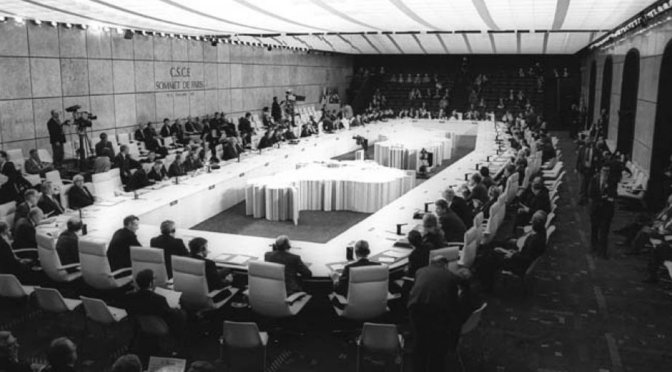
Lidská práva, mír a bezpečnost v Evropě z pohledu politického exilu jakožto nestátního aktéra v mezinárodní politice.
Událost je organizovaná Ústavem pro soudobé dějiny AV ČR ve spolupráci s CEFRESem.
Kdy: 21.– 23. října 2025
Kde: Archiv Parlamentu České republiky (Komunardů 1634/44, Prague 7)
Jazyk: angličtina
V letošním roce si připomínáme 50. výročí podpisu helsinských dohod a zahájení tzv. helsinského procesu, který měl zásadní dopad na politickou situaci v Evropě a na zhroucení komunistického bloku v letech 1989–1991. Tzv. následné schůzky KBSE využívali mnozí vládní představitelé i nevládní aktéři na Západě jako platformu kritiky nedemokratických režimů na Východě zejména v oblasti porušování lidských a občanských práv. Vedle západních politiků se do helsinského procesu přímo či nepřímo zapojovali západní intelektuálové, média nebo lidskoprávní organizace, a z druhé strany železné opony především disidenti. Důležitým, ale dosud opomíjeným aktérem byl politický a kulturní exil několika generací ze střední a východní Evropy. Exilové skupiny disponovaly politickým, kulturním a sociálním kapitálem, který jim umožňoval působit na západní politiky a lobbovat za vlastní interpretaci helsinského procesu. Pro západní vlády, úřady a organizace byli exulanti významným spojencem, protože díky svým kontaktům s domácím prostředím zprostředkovávali cenné autentické informace. Pro východoevropský disent představoval exil klíčovou spojnici k mezinárodnímu prostředí.
Veřejně přístupná debata s bývalými disidenty a exulanty a odborný workshop se konají v rámci grantového projektu Strategie AV21 – Identity ve světě válek a krizí¨.
Program
Pokračování textu Helsinki 50 – Lidská práva, mír a bezpečnost →
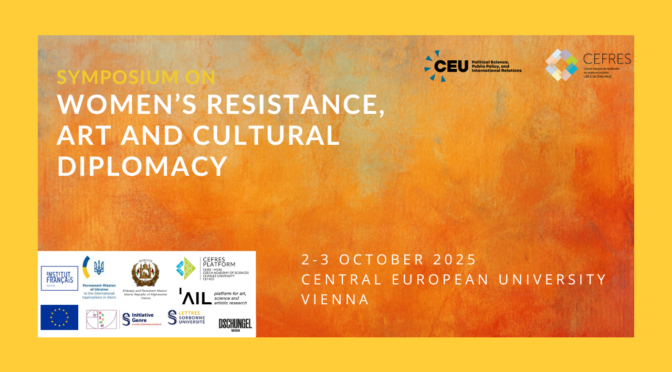
Toto sympozium organizuje Středoevropská univerzita (CEU) ve Vídní a Francouzský ústav pro výzkum ve společenských vědách (CEFRES).
Kdy: 2.-3. října 2025
Kde: Kampus CEU, Quellenstrasse 51, Vídeň
Jazyk: angličtina
Pořadatelky: Valeriya Korablyova, Louisa Martin-Chevalier & Seema Sridhar
Kompletní program v angličtině naleznete zde.
Teze
“The symposium aims to bring together variety of perspectives on creative expressions of women’s resistance through art and cultural diplomacy by engaging with academics, activists and conflict-affected artists. The event is conceived to gather insights from diplomats, scholars specialising in diverse academic streams on feminist scholarship, creative research methods, musicology; activists working with supporting and promoting exiled artists; and conflict-affected artists living in Europe. Pokračování textu Ženský vzdor. Umění a kulturní diplomacie →
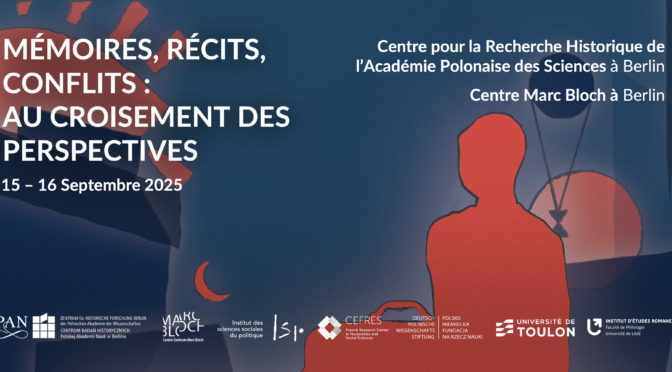
Kolokvium organizují:
Centre d’études historiques de l’Académie polonaise des Sciences (CBH-PAN)
ISP (UMR 7220)
LincS (UMR 7069)
Université de Toulon
Université de Łódź
a Francouzský ústav pro výzkum ve společenských vědách (CEFRES, Praha)
Kdy: 15.-16. září 2025
Kde: Berlín, Polská akademie věd a Centre Marc Bloch
Jazyky: francouzština a angličtina
‘Memory’ as a subject of study and a political, social and media issue has dominated public debate in Europe since the late 1980s. ‘Duty to remember,’ ‘realms of memory,’ ‘wars of memory,’ ‘competition among victims,’ ‘memory invasion,’ ‘paths of memory,’ ‘politics of memory,’ ‘defence of memory,’ ‘murderers of memory’: these expressions reflect a new relationship with the world, a new regime of historicity that François Hartog calls presentism. This new configuration of the relationship with the past is reflected in various identity claims, particularly from previously dominated groups, but also in new institutional practices. Memory becomes a tool for mobilisation and intervention in the media, in public life, in politics in the broad sense of the term, but also in literature and the arts. It fuels epistemological reflection within the humanities and social sciences community. Pokračování textu Paměť, vyprávění a konflikt: V průsečíku perspektiv →
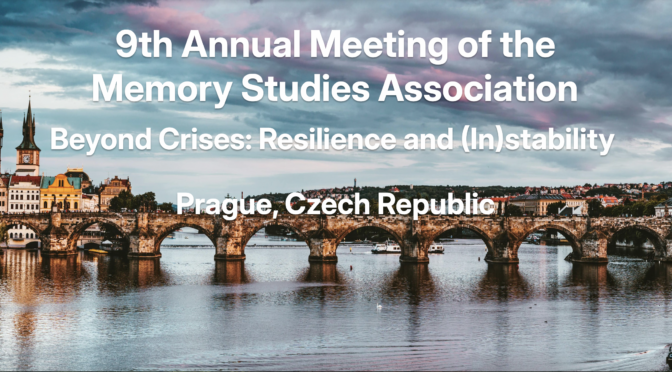
9. výroční setkání Asociace paměťových studií
Konferenci organizují Memory Studies Association, Univerzta Karlova a Akademie věd ČR za podpory CEFRESu.
Kdy: 14.–18. července 2025
Kde: Univerzita Karlova a Akademie věd ČR, Praha
Jazyk: angličtina
With the theme Beyond Crises: Resilience and (In)stability, the conference seeks to explore how the memory of these events and other critical turning points has led to new tensions but also generated new possibilities. What patterns of decisive change can we observe? What is the role of memory in these processes, and how have they been commemorated? How have such critical turning points and their actors been collectively remembered and commemorated? And what can memory teach us amid the ongoing polycrisis?
Organized in the shadow of the conflicts in Ukraine and Gaza, the rise of populist and authoritarian tendencies all over the world, imminent climate collapse and humanitarian crises including ones in public health, Beyond Crises invites a multifaceted discussion on what memory scholars can learn from the memory of earlier crises and how that knowledge might be used to deal with ongoing political and social standoffs. Looking at shared and divided memoryscapes and the voices of marginalized communities, the conference will make a major contribution to the understanding of how societies remember and learn from crises.
There will also be special events such as workshops, exhibitions and film screenings. To embed the conference in the beautiful city of Prague, we will also feature a cultural program (excursions and city walks) by cooperating closely with local memory activists, cultural partners and heritage sites.
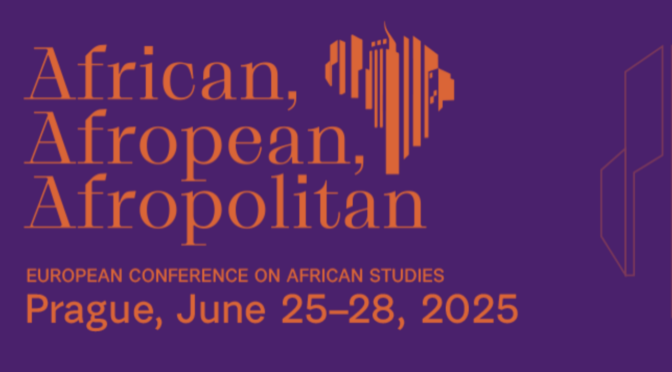
Kdy: 25.–28. června 2025
Kde: Praha
Organizátoři: Czech Association for African Studies & European African Studies Association
Každý druhý rok pořádá AEGIS v jiném evropském městě Evropskou konferenci afrických studiích (ECAS), kterou svolává jeden nebo více členů AEGIS. Stala se největším celosvětovým setkáním afrických studií, účastní se jí vědci z celého světa a zájem o ni nadále významně roste.
CEFRES je hrdým partnerem této mezinárodní konference, která se poprvé ve své historii koná v České republice – jedné z postkomunistických zemí Visegrádu, známé též jako srdce Evropy.
Dvacáté výročí ECAS nám poskytne skvělou příležitost k retrospektivnímu pohledu na uplynulá dvě desetiletí a konkrétně na africká studia v Evropě. Zároveň nám umožní nové pohledy na budoucí vývoj v této oblasti. Uděláme vše pro to, abychom připravili podnětný program složený z přednášek našich hlavních řečníků, plenárních zasedání a kulatých stolů, promítání filmů, výstav knih zaměřených na africká studia a kulturních a uměleckých akcí.
Kompletní program konference naleznete zde.

Kdy: 25.–28. června 2025
Kde: Praha
Organizátoři: Czech Association for African Studies & European African Studies Association
Každý druhý rok pořádá AEGIS v jiném evropském městě Evropskou konferenci afrických studiích (ECAS), kterou svolává jeden nebo více členů AEGIS. Stala se největším celosvětovým setkáním afrických studií, účastní se jí vědci z celého světa a zájem o ni nadále významně roste.
CEFRES je hrdým partnerem této mezinárodní konference, která se poprvé ve své historii koná v České republice – jedné z postkomunistických zemí Visegrádu, známé též jako srdce Evropy.
Dvacáté výročí ECAS nám poskytne skvělou příležitost k retrospektivnímu pohledu na uplynulá dvě desetiletí a konkrétně na africká studia v Evropě. Zároveň nám umožní nové pohledy na budoucí vývoj v této oblasti. Uděláme vše pro to, abychom připravili podnětný program složený z přednášek našich hlavních řečníků, plenárních zasedání a kulatých stolů, promítání filmů, výstav knih zaměřených na africká studia a kulturních a uměleckých akcí.
Kompletní program konference naleznete zde.





